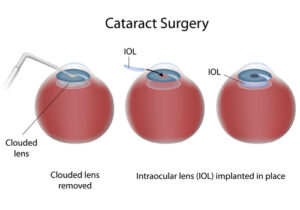6 Signs You Need to Replace Your Intraocular Lens
Have you had your cataracts removed? Complications from cataract surgery are considerably low due to advances in surgical techniques and tools.
Although rare, these complications can still occur in patients. One of the possible complications of cataract surgery is IOL dislocation.
Dislocation of your intraocular lens can cause vision problems and even blindness. Keep reading to learn more about intraocular lens dislocation, its signs and symptoms, diagnosis and treatment, and what to do if it happens to you after having cataract surgery.
What is a Dislocated Lens?
A dislocated intraocular lens is an IOL that has moved out of its proper position. During cataract surgery, your natural lens that has turned into a cloudy cataract is removed.

Your cataract surgeon implants a new intraocular lens that takes the place of the old lens and allows you to see clearly again. The intraocular lens is an artificial lens that should remain in your eye for the rest of your life.
But in some cases, the lens implant can become dislodged. You may experience your IOL becoming dislodged shortly after having cataract surgery or some years later.
There are two main ways lens displacement happens:
- If there’s a tear or defect in the capsular bag holding the lens, the IOL can slip out and fall into the vitreous cavity behind your eye.
- The capsule bag with the lens implant is held in position by string-like tissues called zonules. Zonules connect the bag to the wall of your eye.
Sometimes, some or all of the zonules can become weak and break. Without support, the capsular bag destabilizes and shifts, and the lens gets loose, resulting in a partial or total detachment.
Causes of a Dislocated IOL
Some of the causes of a dislocated lens implant include:
- Trauma at the time of cataract surgery
- Repeated eye infections
- Extreme nearsightedness
- Facial or eye injury
- Retinitis pigmentosa
- Eye inflammation
- Conditions that make the capsular bag unstable, such as pseudo-exfoliation syndrome
- Family history of Marfan’s syndrome, a genetic disorder that affects the connective tissue in your eyes and other parts of the body
- A history of retina surgery or injection therapy
Signs You Need to Replace Your IOL
The symptoms of an IOL that’s become dislocated can be intermittent based on the mobility of the IOL. They include:
Blurred Vision

The most common symptom is blurry vision. It happens when your IOL moves away from your line of sight and settles abnormally on the vitreous humor.
How much blurriness you experience will depend on the severity of the dislocation or detachment.
Seeing Your Lens Implant
If you have a dislocated lens, you may start being able to see the edge of your IOL, especially when lying on your back.
Decline in Vision
You may experience a significant decrease in vision when you have a dislocated lens. Your vision might even reduce to the point of legal blindness.
Sudden vision loss after having cataract surgery could mean that your artificial lens is no longer in the correct position.
Headaches or Pain

You can have headaches, light sensitivity, or pain from inflammation. Inflammation occurs when your intraocular lens moves and rubs on the iris. Inflammation can also cause an increase in eye pressure, leading to glaucoma.
Double Vision
If you have a lens implant that’s slightly dislocated, you may start seeing double or ghost images at night. Some light passes through the edge of the dislodged lens.
For some people, a partially dislocated lens doesn’t cause any symptoms. Their ophthalmologist may discover it during a routine eye exam.
Halos and Glare

You may become very sensitive to glare from light sources and see halos around lights, making nighttime driving difficult.
Diagnosis
During your eye exam, your eye doctor will look for an IOL that appears dislodged. Your ophthalmologist may also use special drops to dilate your pupil and confirm the position of the implanted lens.
If you have an off-center IOL, they will carefully assess the rest of your eye to ensure there are no other concerns before repairing the issue with surgery.
Treatment

Your treatment options will vary based on the severity of the displacement and other factors. For milder cases, your eye doctor might not recommend any treatment other than glasses.
However, you’ll likely require frequent follow-up visits to ensure the dislocation isn’t worsening. Surgery is necessary if the dislodged lens implant is affecting your vision.
Your surgeon will perform a vitrectomy to remove the dislocated IOL and correctly reposition it or implant another one. Your ophthalmologist will consider the benefits of replacing or retaining the IOL depending on various factors, including the condition of the lens.
If your IOL hasn’t fallen into the vitreous cavity, your eye doctor can reposition it without needing a vitrectomy.
What to Do If You’re Experiencing Any Symptoms
You may have complications like intraocular inflammation, glaucoma, corneal edema, or retinal detachment when your lens implant is out of position. Also, the longer your IOL stays dislocated, the higher the risk of scarring becomes in its new place in your eye. Scarring can make it more challenging to safely remove your IOL.
For these reasons, you must see your ophthalmologist without delay if you’re having symptoms. Seeking prompt medical attention after lens dislocation can significantly minimize the chances of eye damage.
See a Dislocated Lens Specialist
If lens dislocation happens, early intervention by Dr. Tokuhara can protect your sight and eyes. Dr. Tokuhara at Desert Vision Center is a trusted dislocated lens specialist and will take prompt steps to restore your vision.
Have you had cataract surgery and suspect that you may have a dislocated IOL that’s shifting? Schedule your appointment at Desert Vision Center in Rancho Mirage, CA, for a second opinion consultation.
You don’t have to suffer from the discomfort that a dislocated lens causes any longer. Do something about it by seeking the opinion of an expert.

